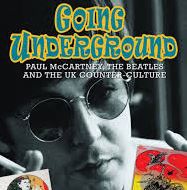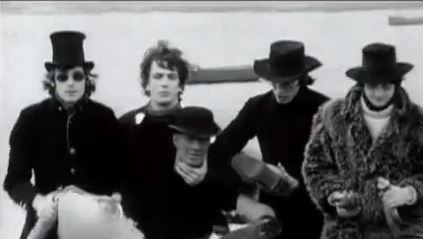
Going Underground
starring Joe Boyd, Robert Wyatt, Mick Farren, Barry Miles, John “Hoppy” Hopkins, Eddie Prevost
Pride DVD

This fascinating look at the London of the 1960s shows us the how and the why of those riotously creative times and the people that propelled popular culture to its limits. The UK of the early ’60s was lumbering out from the austerity of the 1950s and ridding itself of the “mono-culture of British life” with a small group of forward thinkers that had discovered the works of the New York Beat Generation writers and the avant-garde works of American composer John Cage. Nothing was out of bounds, and coupled with the rise of LSD, artists such as Paul McCartney began to look underground for inspiration. They found it in Barry Miles’ Indica Gallery and Bookshop, a common ground of experimental work and fellowship which was patterned in some aspects on the City Lights bookstore in San Francisco. Miles led McCartney to artists such as composer Karlheinz Stockhausen, whose groundbreaking works of electronic music gave rise to McCartney’s “Tomorrow Never Knows” on Revolver.
From the Indica bookshop came The International Times or IT, the newspaper of the underground. Much like Ed Sanders Fuck You, A Magazine of the Arts in New York, IT was the home to poets, activists and artists who were ignored by mass consumption media of the day (until they were arrested, that is). Around the same time, producer Joe Boyd (Pink Floyd) and John “Hoppy” Hopkins began the UFO Club, a legendary cellar that gave rise to AMM, The Soft Machine, and Syd Barrett and Pink Floyd. It was at the UFO club that Timothy Leary’s mantra of “turn on, tune in, drop out” found a home in the UK, as Pink Floyd and others took rock music beyond the three-minute pop song, explored new concepts, and helped, along with the Grateful Dead in America, create an entirely new form of expression and mind expansion.
Although McCartney is not interviewed for this DVD, a wealth of notables from the era are present. Barry Miles, John Hopkins, and Joe Boyd give valuable insights to this age of experimentation, while Robert Wyatt, who got his start drumming for The Soft Machine, and Mick Farren, leader of The Deviants and writer for IT are featured. Sadly, this is most likely one of Farren’s last interviews, as he died after performing in London in 2013. The movie is an absorbing look at a heady time, when London, along with San Francisco, literally changed the world. Highly recommended.












